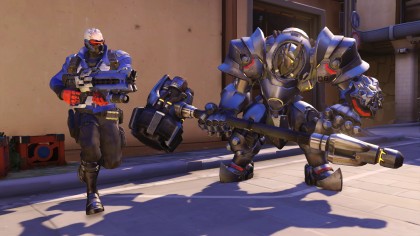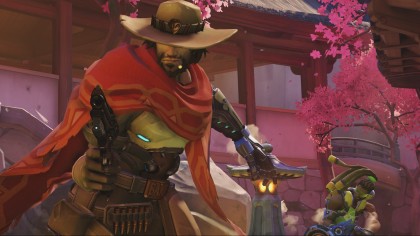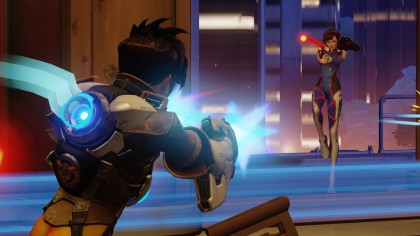Overwatch review
The team that fights together...
Like Battleborn, Overwatch takes something from MOBA games like League of Legends and DOTA, in the variety and weirdness of its characters, and the breakdown of their abilities into a handful with short cooldowns and a single ultimate.
But unlike Battleborn, Overwatch doesn't take more than that - it thinks its players don't want that level of complexity from a team shooter, or at least not in that place.
So, unlike Team Fortress 2 or Battleborn, Overwatch doesn't really have a metagame. You don't really unlock anything useful or interesting by playing more - just cosmetic changes - and you're really just playing to play the game.

Though that means the game never changes or develops except as you do, it also means that your actions in the game have to be valuable in themselves. You don't play Overwatch one more time because you want to get a new type of gun or a new lootbox to drop or to pick up another damn cent like Bioshock Infinite; you play the game for the game itself.
That's partially driven, we assume, by a desire to make this a competitive eSport of a game. Whereas Team Fortress, given its massive array of stat-shifting items with special abilities, could never come within a thousand yards of being balanced, Overwatch is pitching itself as a competitive sport.
In mid-to-late June (around a month away at the time of writing), Blizzard plans to release a Ranked mode, paralleling the Ranked ladders they've introduced in Hearthstone and Heroes of the Storm.
There is a little need for balancing ahead of that. Some characters appear only rarely in matches, because many players think they're worthless.
Get daily insight, inspiration and deals in your inbox
Sign up for breaking news, reviews, opinion, top tech deals, and more.
Roadhog, for example, has a huge health pool, but short-ranged weapons and is slow as anything. In my opinion, if his hook-shot misses, he's basically a sitting duck that the enemy can use to boost their ultimates quickly.

Thankfully, this is Blizzard, which is fresh off Hearthstone and Heroes of the Storm - if a character is broken, we can be reasonably confident that it'll fix them sharpish.
If the eSport aspect doesn't work out for Overwatch, it might get dull. After all, unlike Battleborn and Team Fortress 2, you're not unlocking new interesting twists on your characters as you play - just skins and barks.
In the long term, your interest has to come from the intersection of your abilities and the other players', much like a MOBA's does. If that stops being refreshing, then you'll stop playing.
And that's a niggling concern about Overwatch. Like Titanfall, it's exactly the kind of shiny game that we critics love to love, that we gush over, and that none of us find ourselves playing a month later.
I'm reassured though. Because underneath that Blizzard gloss, I can see the heart of Team Fortress pared down and polished up. That should be enough for anyone.

Verdict: Play It Now
Overwatch is like eating air. All the depth is in the characters themselves and almost nothing in the world. After all, there's almost nothing to the world. A handful of very tight maps, a limited number of game modes, and a good roster of characters. That's it. No metagame, no unlocks that matter, no in-game customisation. Just six mad characters killing six other mad characters, in the purest, most pared-down team conflict.
This game was reviewed on PC.
Techradar's review system scores games as 'Don't Play It', 'Play It' and 'Play It Now', the last of which is the highest score we can give.